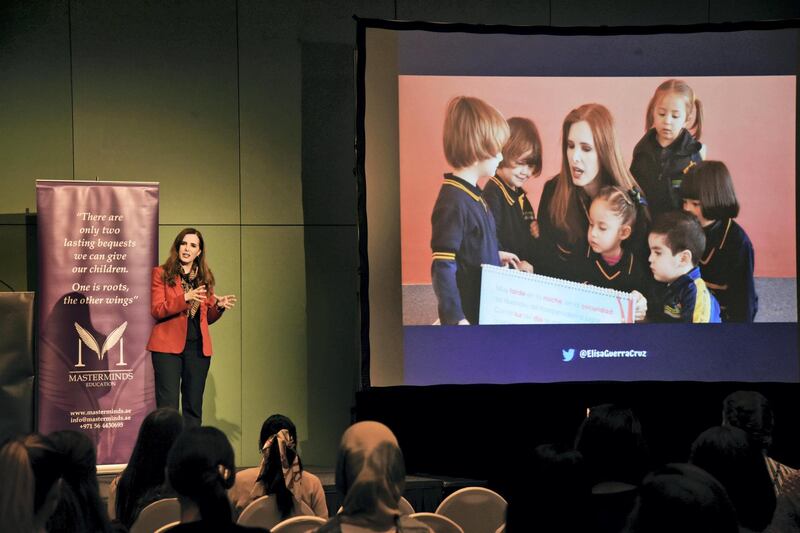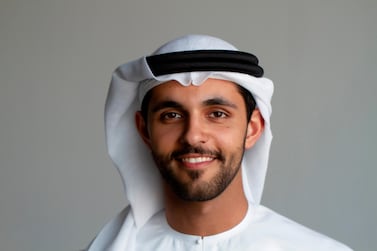Nursery teachers play a vital role in a child’s future development and should not be seen as “glorified nannies”, a UN official said on Tuesday.
Elisa Guerra, a United Nations Educational, Scientific and Cultural Organisation (Unesco) International Commission member for their Futures of Education Initiative, said more importance needs to be placed on children’s brain development until they turn six.
"People do not realise the importance of early childhood development but there is extensive research suggesting that investment in early years education is what creates the greatest impact for children," said, Ms Guerra, who attended the annual MasterMinds Nursery conference in Dubai on Tuesday.
"Even now early childhood educators are seen as glorified nannies in many parts of the world.”
This year, the World Bank described a global learning crisis, saying that, while countries have increased access to education, hundreds of millions of children have reached young adulthood without acquiring basic skills such as calculating the correct change, reading a doctor’s instructions, or understanding a bus schedule.
"Recently, there has been an explosion in research in neuroscience and it's relation to education and how we can teach children in a way that is best for their brain development," Ms Guerra, who was a Latin American Global Teacher Prize Finalist in 2015 and 2016, told The National.
"Teachers in the UAE need to provide a nurturing environment where children can grow and develop."
She said children's brains need to be stimulated through art, music, movement, reading, writing and social activities.
"If you are ready to break some paradigms and recognise the potential, you can tackle important subjects that have not been taken into nursery schools before like early reading.”
Ms Guerra said about 215 million children worldwide cannot read and write properly. “A part of the problem is we are teaching our children too little, too late and too badly."
Instead, reading should be treated as a brain function not a school subject or a chore.
She called on nurseries to create integrated programmes that take the interests of the child into consideration.
"We need to present reading to children in a way that is easy and enjoyable to them. If children love to read they will not need encouragement, they will pick the books up by themselves.
"The problem is that the way we have been teaching children to read, it becomes an exercise.
“We teach the children a set of rules and we make it so hard for them to be able to read and write when it should be more natural."
She said children should simultaneously be learning about painting, music and play different instruments or do gymnastics for brain development.
In this year’s emirate-wide school inspection report, the Knowledge and Human Development Authority, Dubai's education regulator, found that only 14 per cent of schools were effectively developing reading across the curriculum,
Teachers in the emirate said they struggled to promote reading among pupils as it was typically "not part of the life" of children away from the classroom.
Tania Siddiqui, director at Masterminds Education, a nursery in Dubai, said her nursery endeavours to make all subjects stimulating for children so they make use all areas of their brain.
"Everything we do is based on brain development. We include Arabic, French, English daily because language has to have a huge focus," she said.
"Our daily physical programme is one where children do gymnastics, learn ball skills and swimming all of which linked to brain development.”
The nursery also seeks to teach more technical subjects in an exciting way.
"We have to feed children’s natural curiosity. We treat mathematics a language but we explore information through creative play.
"We do not teach children alphabets but if a child is interested in body parts we talk about different body parts and connect these with songs and movement."
Masterminds Education also encourages children to speak in their native language to encourage an immersive language learning experience.
Savvy Kisani, founder of British Berries Nursery, Little Nest Nursery and Little Kingdom nursery in Dubai, is mother to a child with autism and has ensured brain development is a key focus at her nurseries.
“I looked into neuroscience research and how to apply it to improve a child’s brain development," she said.
"We collected books and have libraries in each classroom. We start children off with a toy library and then the next day we replace it with a book. Once the child has finished reading, we bring out the toy library again, so we blend toys with books.
"They started getting interested in the books as we introduced them to it slowly and we have seen children come to us and want us to read to them," Ms Kisani.
In 2015, Sheikh Mohammed bin Rashid, Vice President and Ruler of Dubai, launched the Arab Reading Challenge to encourage a million pupils to read 50 books in one year. The challenge works to raise awareness about the importance of reading among Arab pupils in the region and worldwide.








